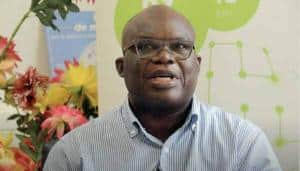
To activate translation, click the “CC” button along the bottom of the video player. Then click the Settings button next to it, select Subtitles/CC, and click on Auto-translate and select the language you want to read captions.
Pour activer la traduction, cliquez sur le bouton “CC” en bas du lecteur vidéo. Cliquez ensuite sur le bouton Paramètres à côté, sélectionnez Sous-titres / CC, puis cliquez sur Traduction automatique et sélectionnez la langue que vous souhaitez lire les sous-titres.
Oil and gas discovery in Ghana since 2007 has attracted the interest of many international and local actors, including transnational corporations. Contrary to the expected benefits of oil to broad-based development, the industry has perpetuated exclusion and poverty in communities in the neighbourhood of extractive activities. In particular, the globalized environment which underscores the industry has shaped the governance and benefit-sharing mechanisms to exclude a wide range of local citizens, particularly women, from the actual gains of the industry. This experience is worsened by other ramifications such as water pollution, dwindling fish stock, and overpopulation due to the growth of migrant workers in booming oil towns. This paper utilizes a feminist political ecology framing to examine the gendered disparities in the sharing of benefits and the ramification of these interactions on women’s livelihoods. In particular, the paper relies on data from fieldwork conducted in Ghana in 2019 to explore how the power and agency of varying stakeholders result in differentiated impacts of the hydrocarbon industry on communities. Considering that the gendered impacts of mainstream economies remain poorly understood, this paper contributes to the existing scholarship on both the outcomes of Ghana’s oil and gas industry and feminist political ecology theorizing.
La découverte de pétrole et de gaz au Ghana depuis 2007 a suscité l’intérêt de nombreux acteurs internationaux et locaux, y compris des sociétés transnationales. Contrairement aux avantages attendus du pétrole pour un développement à grande échelle, l’industrie a perpétué l’exclusion et la pauvreté dans les communautés à proximité des activités extractives. En particulier, l’environnement mondialisé qui souligne l’industrie a façonné les mécanismes de gouvernance et de partage des avantages pour exclure un large éventail de citoyens locaux, en particulier les femmes, des gains réels de l’industrie. Cette expérience est aggravée par d’autres ramifications telles que la pollution de l’eau, la diminution des stocks de poissons et la surpopulation due à la croissance des travailleurs migrants dans les villes pétrolières en plein essor. Cet article utilise un cadre d’écologie politique féministe pour examiner les disparités entre les sexes dans le partage des avantages et la ramification de ces interactions sur les moyens de subsistance des femmes. En particulier, le document s’appuie sur les données d’un travail de terrain mené au Ghana en 2019 pour explorer comment le pouvoir et l’action de différentes parties prenantes entraînent des impacts différenciés de l’industrie des hydrocarbures sur les communautés. Considérant que les impacts sexospécifiques des économies traditionnelles restent mal compris, ce document contribue à la recherche existante sur les résultats de l’industrie pétrolière et gazière du Ghana et sur la théorisation de l’écologie politique féministe.
4 Responses
This is a thoughtful analysis. What will be done with those results? Are your results used to stimulate a discussion in the region on the gender specific impact of gas and oil extraction?
Thank you for your comment. My hope is that this topic will stimulate further discussion on women’s position in oil and gas extraction not only in Ghana but also other African countries. I had hoped to conduct a similar study for Uganda however, those plans have been put on hold due to COVid19.
Thank you, Sandra.
Women also do have agency and are not necessarily passive. I see that you note that some women own fishing boats. You make a comment that women supplement men’s (husbands) income. Are there no instances where women earn more? Maybe we need to start re-shaping the discourse on gendered income as well.
In this virtual conference, Ravic and Tobias also look at CSR. It might be good for you to watch their video presentations as well.
Yes, I agree with you. There’s need to reshape the discourse from only looking at women as victims to address the nuance of women’s agency. While the political, socioeconomic and cultural environment in Ghana’s oil and gas industry does not pay close attention to its differentiated impacts on women’s livelihoods, women have adopted means to maneuver these challenges. Some have even risen to a point where they are better off than the men. Therefore, it is important to bring women to the forefront of oil development discussions and coast livelihoods policy. And thank you for the recommendations.
Comments are closed.